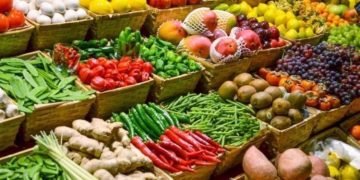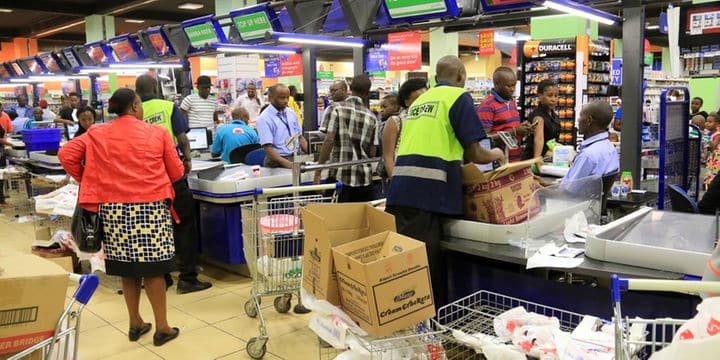Kenyans had to dig deeper into their pockets in July 2025 as the cost of basic commodities like maize flour, sugar, and fuel surged, pushing the country’s annual inflation rate to 4.1%.
The increase in price was mainly driven by rise in prices of commodities in the Food and Non-Alcoholic Beverages Category (6.8%); Transport (4.1%) and Housing, Water, Electricity, Gas and other fuels (1.3%) over the one-year period.
These three major categories together account for over 57 per cent of the total weight across the 13 major expenditure categories.
Additionally, Alcoholic Beverages, Tobacco and Narcotics recorded an inflation of 5.1 per cent in July 2025.
According to the latest report by the Kenya National Bureau of Statistics (KNBS), both core and non-core components of the Consumer Price Index (CPI) basket recorded notable increases, with food and household essentials leading the surge.
On a month-to-month basis, the inflation rate stood at 0.1 per cent, reflecting steady price pressure in key sectors.
The annual inflation was mainly attributed to a rise in prices across several COICOP (Classification of Individual Consumption by Purpose) divisions, highlighting persistent strain on household budgets.
Increase in Prices of Core and Non-Essential Items in July
Maize flour (sifted) recorded a 1.2% price increase, while sugar went up by 1.4% over the past month. At the same time, fuel prices saw a spike, with kerosene rising by 6.7%, diesel by 5.4%, and petrol by 5.2%.”
Other commodities that recorded price increases include tomatoes (1.2%), beef with bones (0.5%), cooking gas (13kg) (0.4%), electricity (50 kilowatts) (0.6%), and single room rent, which rose significantly by o.1%.
However, some relief was noted in other areas. Prices dropped for electricity (200 kilowatts) by 1.4%, oranges by 2.6%, potatoes by 2.0%, cabbages by 1.3%, carrots by 0.7%, cooking oil by 0.6%, beans by 0.5%, and fresh packeted milk by 0.2%.
Also Read: Mbadi Clarifies Fuel Price Hike and Alleged Ksh7 Additional Levy
Between July 2024 and July 2025, Kenyans experienced a steady rise in the cost of many essential goods.
Tomatoes recorded the highest annual price increase at 20.3%, followed by maize grain at 18.4%, carrots at 17.7%, and sifted maize flour at 17.5%. Sugar went up by 13.6%, while oranges rose by 16.1%.
Other notable increases were seen in kales (9.5%), beef with bones (9.9%), and cabbages (7.1%).
Prices of onions rose slightly by 2.5%, potatoes by 1.5%, and single room rent by 1.7%.
Energy-related costs also climbed, with electricity (50 kilowatts) rising by 2.1%, cooking gas (13kg) by 5.0%, and diesel by a modest 0.2%.
While many basic items became more expensive over the year, a few saw slight price drops.
Beans recorded a 1.0% decrease, fresh packeted milk dropped by 1.8%, and petrol prices went down by 1.1%. Cooking gas (13kg) fell by 2.3%, kerosene by 2.9%, and electricity for households consuming 200 kilowatts declined marginally by 0.1%.
Also Read: Win for Farmers as Government Increases Sugarcane Prices
Impact on Household
The rising cost of food, fuel, and electricity in July meant that many families were forced to adjust their budgets.
The inflation rate for June 2025 was also 3.8%, indicating a persistent strain on the cost of living over the past two months.
The Consumer Price Index (CPI) is an economic tool used to track changes in the cost of a typical basket of goods and services purchased by households.
Changes in the CPI are used to calculate the inflation rate, which plays a major role in guiding economic decisions. These include government budget planning, wage adjustments, and interest rate policies set by the Central Bank.
To compile the CPI, the Kenya National Bureau of Statistics (KNBS) collects retail prices from 50 designated zones across the country—14 located in Nairobi and 36 in other urban areas.
These data collection zones represent a range of income groups, ensuring the CPI reflects the spending patterns of low-, middle-, and high-income households. Price data is gathered monthly, usually during the second and third weeks.
Follow our WhatsApp Channel and X Account for real-time news updates.















































































It’s not often I feel compelled to comment, but this post really moved me. The way you approached this topic with such nuance and clarity is truly commendable. It’s a significant contribution.